- Home
- Isaac Hooke
Refurbished Page 2
Refurbished Read online
Page 2
“For your own safety,” Jerry said. “And mine.”
“Why can’t I actually feel the restraints?” Eric asked.
“That’s because there aren’t any,” Jerry said. “At least, not physically. Your restraints are virtual, you see.”
“Virtual? What do you mean?”
“Let me demonstrate.” Jerry’s eyes defocused, as if gazing at something visible only to him, perhaps courtesy of those glasses. They provided some crude form of augmented reality no doubt. In his day, the military had only just begun to experiment with AR, but apparently they had come a long way since then. Assuming he was actually at a military base, of course.
Suddenly Eric could move his head, but nothing else.
He did so, and heard a strange buzzing, as if an insect were flying near his ear. He did his best to ignore it.
The first thing he did was look down at himself, in search of restraints. There weren’t any. But that wasn’t what concerned him.
The body he saw wasn’t his own.
His chest was heart-shaped, about half the size it should have been, and covered in black metal, or perhaps polycarbonate polished to a metallic sheen.
Composite. It’s a polycarbonate-metal composite.
He wasn’t sure how he knew that.
The chest area ended in a small tube of similar material, which replaced his abdomen. That tube was connected to a dark polycarbonate waist that was little more than a rectangular bar. Below it, two cylinders extended toward the floor, replacing his legs. In the knee area, two small spheres served as joints. At the lower extremity of the legs he spotted feet topped by small digits—toes. His arms were made of similar cylinders jointed with spheres, and also terminating in hands and fingers. The digits at either extremity moved when he wiggled them.
He realized that the humming he heard wasn’t due to an insect—he heard it whenever he moved his head, or wiggled his digits.
The sound of servomotors.
“We’ve done a Mind Refurb,” Jerry said. “Uploaded a copy of your neural imprints, your very consciousness, into a machine. A robot, to be precise: the Cicada A21.”
“This can’t be happening,” Eric said.
So he didn’t actually have a chip in his head. But something worse.
He was that chip.
2
Eric simply gazed at his polycarbonate body, unable to fully comprehend what had been done to him.
He should have felt panic, or perhaps outrage, but instead he experienced only that same, all-pervading calm.
I’m dead. In hell. And I don’t even care.
He glanced at Jerry. “All right then. So what do you want?”
“Good,” Jerry said, eyes defocused as he gazed at his AR display. “The ataraxy seems to be holding. It doesn’t always endure the shock of learning what you are. You’ve passed the first test.”
“You make it sound like you’ve done this before?” Eric said.
“We have,” Jerry said. “Ninety-one times, actually. You are the ninety-second iteration. ES-92.”
Jerry sat back, and folded his hands in his lap.
“The most important parts of your brain were recoverable,” the man continued. “The gunshot penetrated the skull and mangled the brainstem. The region responsible for instincts, and breathing, and whatnot. The animal brain. We’re able to emulate all that in software. The regions for higher order thinking—cognition, personality, consciousness—all of that remained intact. The good stuff.”
“That still doesn’t explain how I got here,” Eric said. “You’re leaving out a lot of detail. Going from gunned down in a downtown convenience store to robot’s brain isn’t a small step.”
“You paid to have your brain preserved after death by a company known as Venus Cryo. Sound familiar?”
“Unfortunately, it does.” One of the software engineers on the periphery of his social circle had founded the company in question, and had convinced Eric to invest in the startup. In exchange, Eric would receive a free beheading after death. That, and the promise his shares would actually be worth something if the company ever went public. Assuming he survived long enough.
“When you died,” Jerry continued. “Venus rushed their local techs to the hospital, drained your blood, and chopped off your head. They promptly dumped your disembodied noggin in a cryo bath and sealed the tank. Your head has been in cold storage for two hundred years. It was only when a couple of neural researchers made a breakthrough that you actually became of use.”
“A breakthrough?”
“Yes,” Jerry said. “The ability to read the data left behind in brains that had been destroyed by cryo freezing. The echoes of their neural imprints. Their engrams.”
Eric was reminded of what a friend who worked in the data recovery business had told him. Hard drives stored bits in what were essentially magnetic arrays whose orientations indicated a zero or one. The technology used to recover erased drives relied on the fact that those orientations were never precisely a clean zero or one, and thus even when overwritten, those bits contained an “echo” of the previous value. His friend often bragged about how many people had lost lawsuits with data he had restored, because they incorrectly thought they had wiped the drive.
“After that discovery, the US Army began buying up various cryogenic companies that began to go bankrupt or become insolvent over the years,” Jerry continued. “Companies that had promised their clients everlasting life, but had no way to follow through. Venus Cryo was one of those companies. Venus was one of the better, in fact, at least in terms of record keeping: we have complete backgrounds on all of their clients. We’ve been kilning anyone who has even a hint of military training.”
“Kilning?” Eric asked. But he knew what it meant the moment the word left his lips.
“The name of the invasive procedure we use to extract memories,” Jerry said. “It involves chemical etching and lasers. Eats away the host brain from the outside in, destroying it in the process.”
“Uh,” Eric said. “So that means Eric Scala, the real Eric Scala, is dead. Completely.”
“Afraid so,” Jerry told him.
“And I’m just a collection of his memories,” Eric said. “A pale imitation.”
“No,” Jerry said. “You’re more than just a collection of memories. You’re everything that made Eric Scala who he was. A conscious, sentient, self-aware entity, capable of rational thought.”
“But minus the human element,” Eric insisted.
“The human element is still present,” Jerry said. “But suppressed, admittedly.”
“You mean my emotions…” Eric said.
“Yes,” Jerry said.
“And my reproductive capabilities…” Eric said.
“Only partially true,” Jerry said. “While you can’t reproduce in the traditional sense, it’s easy enough to create a new you. For us, I mean. We just have to take Eric Scala’s mind dump, implant it in a new host—doesn’t even have to be a Cicada—and presto, a new you. We’re field-testing four of you already, actually. ES versions 23, 47, 62, and 78.”
“What happened to the other eighty-eight iterations?” Eric asked.
“They didn’t take,” Jerry said.
“What’s that mean?” Eric said.
Jerry shrugged. “Quantum effects influence the restoration process. Sometimes a Mind Refurb won’t achieve consciousness. Or sometimes its personality is vastly different. Or its memories are a mess. Like I told you, it doesn’t take.”
“Why ‘kiln’ people who have been dead for so long?” Eric asked. “Why not harvest minds from those who died in this century? It seems to me they’d have an easier time adjusting.”
“Believe me, where you’re going, you’ll adjust just fine,” Jerry said.
“Not sure I like the sound of that,” Eric said. “But you didn’t answer my question. Why do you have to rely on cryo farms to harvest the minds you need?”
Jerry sighed. “You Scala variants alway
s ask the same questions. Well, those of you who aren’t reduced to blathering idiots after the initial boot up, anyway. The answer is: the law doesn’t apply to anyone dead over a hundred years.”
Eric was about to ask what law, but then he knew. “The Mind Refurb Act of 2188.”
“Yes,” Jerry said. “It applies retroactively, making it illegal to install human minds born after 2122 into AI cores. It’s just a terrible way to stifle progress, in my opinion. Those who want to live on in machines have to travel to other countries. An expensive proposition, something open only to the rich. They know it’s not a path to immortality, they know their existing brains will die, but they still do it, for the small chance that a part of themselves will live on after death. Once they leave the country, their minds are out of our reach.”
“There was another bill passed in 2122,” Eric said, searching his memories. “The AI Ownership Act. It essentially prohibits AIs from running companies.”
“Yes indeed,” Jerry said. “They were pushed by the same group of technology company lobbyists. You see, a competitor had recently instated an AI as CEO. An AI based on the mind of a human being who had recently passed. I have mixed feelings about that one. On the one hand, it’s good, because it means only humans can own companies. On the other hand, it means only humans can own companies. If you catch my drift...”
“I think I do,” Eric said. “So with these laws, even if the military forced people to donate their brains after death, there would be nothing you could do with them.”
“That’s right,” Jerry said. “The military has in fact started cryo freezing the brains of those who die in the line of duty, in anticipation of the Mind Refurb Act someday lifting. But it probably won’t be for a while yet. Hence, we’re scouring the past for people like you. And besides, we don’t have a lot of actual deaths in the army these days anyway, since most of the troops have been roboticized. Deaths in the line of duty are extremely rare.”
“I still can’t see how this is allowed,” Eric said. “Even if technically, the time of my death makes me eligible for a Mind Refurb as you call it, I never gave permission for any of this.”
“You didn’t have to give permission,” Jerry said. “When the army purchased Venus Cryo, you became army property.”
“Why do you need to inject human minds into AI cores anyway?” Eric said. “Surely you’ve achieved the singularity by now?” He knew the instant he asked the question.
“Oh, we have,” Jerry said. “Truly self aware machine intelligence was achieved long ago, but this allows the army to get around the ban on autonomous machines pulling the trigger.”
“There’s a ban on that?” Eric asked.
“Yes: McKinley’s Anti-Autonomous Firing Solution Act. But we can get around it with the likes of you. Put some AI cores operated by human minds into the fray, something that’s not classified as machine, but not entirely human either, and the army can skirt the law. For now. It’s kind of a loophole. Though congress might very well change that ahead of the Midterms. Mob panderers.”
Thanks to his core, Eric knew that when the singularity was achieved, humanity was nearly destroyed. After picking themselves up and rebuilding the pieces, the governments of humanity implemented strict controls on all AIs going forward, including a ban on any military usage.
But humans injected into AI cores allowed the army to achieve that happy medium they were looking for. Mind Refurbs were AI enough to be mission ready, and human enough not to plot humanity’s downfall. One Mind Refurb could take the place of twenty human drone operators, operating the same number of armed recon drones at once. And a Mind Refurb could participate directly in infantry operations, alongside tanks and other robotic units under his or her control. Everything could be done remotely, if comm signals were strong enough, or if necessary, the Mind Refurb could be placed directly into the action.
The psychological evaluator cocked his head. “I think we’re ready to try lifting the ataraxy.” His eyes defocused.
The sense of calm abruptly lifted, and Eric felt… anxious. Suppressed emotions welled up inside of him. He thought of his girlfriend, and how he would never see her again. He thought of the cokehead who had killed him, and robbed him of the life he could have lived. Was supposed to have lived. And now he was revived, restored to a mere shadow of his former self, his memories and personality thrust into an AI core to serve at the army’s whim.
I’m dead I’m dead I’m dead.
The sense of loss he felt for the life that could have been was like a sharp, physical pain he experienced in the pit of his stomach. Or rather, power cell, given his current body.
He tried to move once again, but was still restricted to wiggling his fingers and toes, and tilting his head. He repeatedly banged that head, hard, against the table behind him, wanting the pain to end.
I’ve lost all my friends. My family.
CLANG. CLANG. CLANG.
“Ordinarily you won’t experience such sharp feelings while out in the field,” Jerry said. “While we give you a small sense of emotion so you still feel human, we keep them dialed way down. What we’re doing here is a simple stress test to determine how well your mind has taken to the AI core this iteration.” He paused. “Your neural network appears to be functioning within operational parameters.”
CLANG. CLANG. CLANG.
Jerry’s eyes focused on Eric.
“Would you mind not doing that?” Jerry said. “If I have to install a new version of you into the AI core, I’d prefer that you didn’t damage the neck servomotors, nor the brain case.”
Eric stopped. He stared straight ahead. Not seeing the human being before him. Not seeing anything.
“You passed test number two,” Jerry said. “Barely.” He paused, as if considering. “Well, I might as well give you a pass. It seems a waste to have to dump your core and go through the effort of a fresh install, given that you are operating within the recommended limits. Even if we are cutting it kind of close to those limits.” His eyes defocused. “I’m dialing your emotions down to a more manageable level.”
The pain of loss he felt in the pit of his stomach became a distant throbbing, and the feeling of calmness returned to the forefront. It wasn’t as powerful as before, but it was enough. Eric would have exhaled in relief if he had a body.
“Better?” Jerry asked.
“Yes,” Eric said.
The door to the room slid aside, and a humanoid robot entered. Its body seemed to be the same general shape as Eric’s, though it was difficult to tell, as it wore a pair of baggy cargo pants, with a white T shirt cloaking the torso and abdomen region. The exposed arms were cylindrical like Eric’s, with different-sized spheres standing in for the elbow, wrist, and finger joints, however those arms weren’t black in hue like his own polycarbonate, but rather flesh-colored.
The robot wore thick black boots, and on its head was a camo cap. Holes had been cut into the cap to allow a pair of small rabbit ears to emerge, like the kind one would find on a WIFI unit.
Underneath that cap he saw an oval-shaped head. Unlike the Hal 9000 dude, the face had actual features. It still had two blue dots for eyes, a squarish red sensor for the nose, and a grill for a mouth, but the surface around them was also skin-colored, and extremely detailed. It had to be a thin layer of some sort of bendable LED material, because he saw eyelids, sclera, and bags represented around the blue dots of the eyes. And on the forehead region, thick eyebrows were depicted, along with wrinkles. The curves of a nose surrounded the red sensor at the center of that face, and around the mouth grill were human-style lips. A cigar was drawn tattoo-like over the mouth area, as if the robot was chomping down on it constantly.
Eric instinctively knew how to ID the robot, and different characteristics appeared on his HUD.
Cicada A21 JB-18 “Dickson.”
Rank: Staff Sergeant.
Make: Cicada.
AI Variant: JB-18.
“Dickson,” Eric said. “Your name is Di
ckson?”
“Very good, cicada man,” the robot replied with a distinctly Texan drawl.
The LED lips moved as the robot talked, Eric noticed. As did the cigar.
Nice touch.
Eric’s torso slid downward and his feet hit the floor. He grabbed onto the table to steady himself.
Jerry had released him from the virtual binds.
Dickson tossed him a folded outfit.
Eric reacted instantly, shooting out a hand to grab the clothing.
“Put this on,” the robot said. “Can’t have you walking naked around the compound.”
Eric examined the shirt’s inner label. The size read medium.
“It’s your size,” Dickson said. “We’re all the same size round these here parts. Makes sharing outfits real simple. And sharing girlfriends.”
“You have girlfriends?” Eric said.
“Just because I’m a robot don’t mean I can’t form an emotional bond with a woman,” Dickson said.
“But I thought…” Eric glanced at the empty area between his own legs.
“There are anatomical attachments,” Dickson said. “Now get dressed before I do it for you.”
Eric shrugged on the T shirt, and slid on the cargo pants. The fit was perfect, as Dickson promised. His servomotors continued to hum with every movement.
“Here, check yourself out,” Dickson said.
Text overlaid Eric’s vision.
Cicada A2-9 “Dickson” wishes to share a video feed with you. Accept? Y/N.
Eric was about to ask how to accept but then he knew.
He focused on the letter Y.
A video sourced from Dickson’s viewpoint appeared in the center of his vision. It was about as big as a 12-inch laptop screen held at arm’s length. He knew how to move the feed to the upper right of his view so that it didn’t obscure his main vision. When he focused on the contents of that feed, he realized he was looking at himself from Dickson’s point of view.
He looked much the same, body-wise, as the other robot, except his exposed arm cylinders were black rather than skin color. The lower hem of the shirt helped hide the fact that he had only a tube for an abdomen, and he looked almost normal. So far, he had been avoiding looking at his face, but he decided he might as well get it over with.

 Warden 2
Warden 2 Devastator
Devastator Warden 4
Warden 4 Emperor
Emperor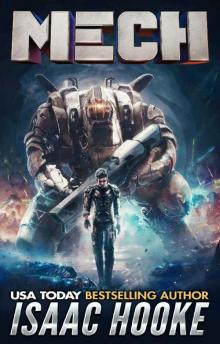 Mech
Mech Conqueror
Conqueror Fighter
Fighter The Forever Gate Ultimate Edition
The Forever Gate Ultimate Edition Defiler
Defiler Mech 2
Mech 2 Warden 3
Warden 3 Warden 1
Warden 1 Mech 3
Mech 3 Forerunner
Forerunner The Alliance (AI Empire Book 2)
The Alliance (AI Empire Book 2) Breaker (Monster Tamer Book 1)
Breaker (Monster Tamer Book 1) Bender of Worlds
Bender of Worlds The Pendulum Swings (The Forever Gate Book 8)
The Pendulum Swings (The Forever Gate Book 8) The Link
The Link Just Another Day
Just Another Day Star Warrior
Star Warrior Alien War Trilogy 1: Hoplite
Alien War Trilogy 1: Hoplite Battle Harem 3
Battle Harem 3 The Ethan Galaal Series: Books 1 - 3
The Ethan Galaal Series: Books 1 - 3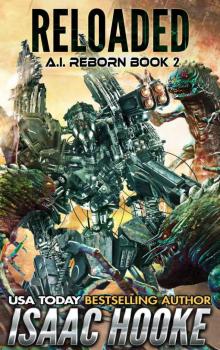 Reloaded
Reloaded Robot Dust Bunnies (Argonauts Book 5)
Robot Dust Bunnies (Argonauts Book 5) Battle Harem
Battle Harem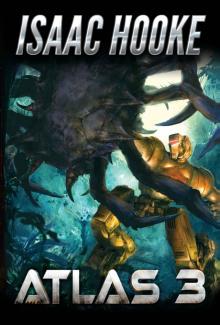 ATLAS 3 (ATLAS Series Book 3)
ATLAS 3 (ATLAS Series Book 3) Argonauts 2: You Are Prey
Argonauts 2: You Are Prey Worlds at War (A Captain's Crucible Book 5)
Worlds at War (A Captain's Crucible Book 5) Operation: Bug Spray (Argonauts Book 9)
Operation: Bug Spray (Argonauts Book 9) Battle Harem 2
Battle Harem 2 Redeemed (Bolt Eaters Trilogy Book 3)
Redeemed (Bolt Eaters Trilogy Book 3)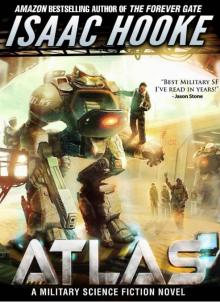 Atlas
Atlas Argonauts 1: Bug Hunt
Argonauts 1: Bug Hunt Reactivated (Bolt Eaters Trilogy Book 1)
Reactivated (Bolt Eaters Trilogy Book 1)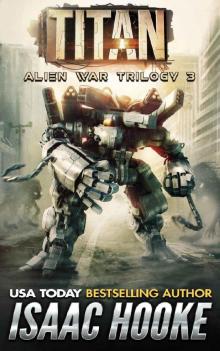 Alien War Trilogy 3: Titan
Alien War Trilogy 3: Titan Flagship (A Captain's Crucible #1)
Flagship (A Captain's Crucible #1)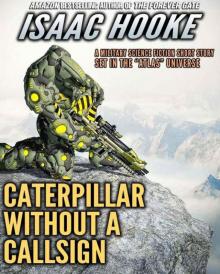 Caterpillar Without A Callsign
Caterpillar Without A Callsign The Forever Gate
The Forever Gate He Who Crosses Death (Star Warrior Quadrilogy Book 3)
He Who Crosses Death (Star Warrior Quadrilogy Book 3) Reforged (Bolt Eaters Trilogy Book 2)
Reforged (Bolt Eaters Trilogy Book 2) Refurbished
Refurbished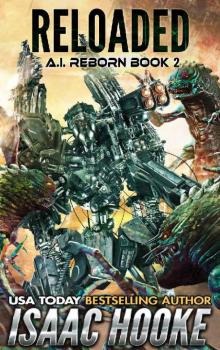 Reloaded (AI Reborn Trilogy Book 2)
Reloaded (AI Reborn Trilogy Book 2) He Who Crosses Death
He Who Crosses Death Explorations: First Contact
Explorations: First Contact Planet Killer (A Captain's Crucible Book 4)
Planet Killer (A Captain's Crucible Book 4) Quantum Predation (Argonauts Book 4)
Quantum Predation (Argonauts Book 4) Clandestine-IsaacHooke-FreeFollowup
Clandestine-IsaacHooke-FreeFollowup The Last Stand (The Forever Gate Book 9)
The Last Stand (The Forever Gate Book 9) City of Phants (Argonauts Book 6)
City of Phants (Argonauts Book 6) Test of Mettle (A Captain's Crucible Book 2)
Test of Mettle (A Captain's Crucible Book 2) Cradle of War (A Captain's Crucible Book 3)
Cradle of War (A Captain's Crucible Book 3) Rade's Fury (Argonauts Book 7)
Rade's Fury (Argonauts Book 7) Rebirth (The Forever Gate Book 6)
Rebirth (The Forever Gate Book 6) The Forever Gate Compendium Edition
The Forever Gate Compendium Edition Mechs vs. Dinosaurs (Argonauts Book 8)
Mechs vs. Dinosaurs (Argonauts Book 8) Alien War Trilogy 2: Zeus
Alien War Trilogy 2: Zeus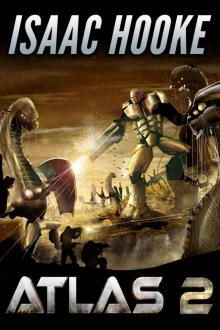 ATLAS 2 (ATLAS Series Book 2)
ATLAS 2 (ATLAS Series Book 2) Operation_Bug Spray
Operation_Bug Spray